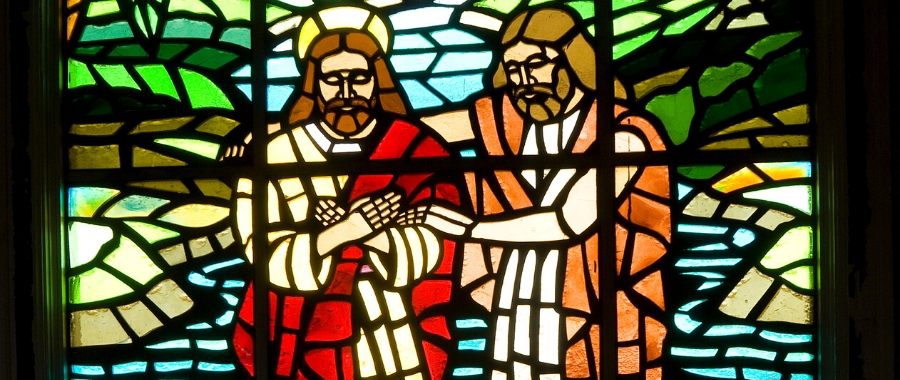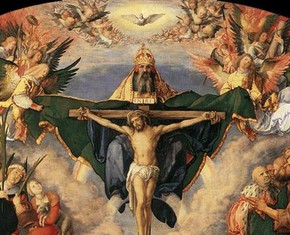The views expressed in our content reflect individual perspectives and do not represent the authoritative views of the Baha'i Faith.
Many, many prophecies focus on “return,” not only predicting but guaranteeing that a messenger of God will come back again. The Baha’i teachings point out this consistent prophetic theme:
If thou wilt observe with discriminating eyes, thou wilt behold all [the prophets] abiding in the same tabernacle, soaring in the same heaven, seated upon the same throne, uttering the same speech, and proclaiming the same Faith. Such is the unity of those Essences of Being, those Luminaries of infinite and immeasurable splendor! Wherefore, should one of these Manifestations of Holiness proclaim saying: “I am the return of all the Prophets,” He, verily, speaketh the truth. In like manner, in every subsequent Revelation, the return of the former Revelation is a fact, the truth of which is firmly established. – Baha’u’llah, The Book of Certitude, pp. 153–154.
The most well-known example in Western culture is the idea of Christ’s “return,” popularly referred to as the “Second Coming” or the “Second Advent.”
Several articles in this “Figuring Out Prophecy” series have elaborated on this very topic. In Western religious traditions, “return” excludes reincarnation, since mainstream Judaism, Christianity and Islam reject the idea of metempsychosis, the transmigration of the soul.
Although the Baha’i teachings rule out reincarnation for the messengers of God, some parallels do exist across historical time between those messengers – including the distinct similarities between the missions of John the Baptist, the herald and forerunner of Christ; and the Bab, the herald and forerunner of Baha’u’llah.
The Baha’i teachings explain that “the advent of John the Baptist” was, “according to various authorities,” “the originator of laws which abrogated the teachings current among the Jews.” – Shoghi Effendi, Unfolding Destiny, p. 427. He further wrote that the Bab was “the ‘Return of John the Baptist’ expected by the Christians.” – God Passes By, p. 58.
Here, the Baha’i conception of “return” describes a previous pattern of events repeated under later, factually distinct circumstances – a repeat scenario, if you will. In this context, Baha’u’llah draws some significant parallels between John the Baptist, in relation to Jesus, and the Bab, relative to Baha’u’llah:
They that have turned aside from Me [Baha’u’llah] have spoken even as the followers of John (the Baptist) spoke. For they, too, protested against Him Who was the Spirit (Jesus) saying: “The dispensation of John hath not yet ended; wherefore hast thou come?” Now, too, they that have repudiated Us, though they have never known Us and have been at all times ignorant of the fundamentals of this Cause, knowing not from Whom it proceeded or what it signifieth, have spoken that which hath made all created things to sigh and lament. …
John, son of Zacharias, said what My Forerunner [the Bab] hath said: “Saying, repent ye, for the Kingdom of heaven is at hand. I indeed baptize you with water unto repentance, but He that cometh after Me is mightier than I, Whose shoes I am not worthy to bear.” Wherefore, hath My Forerunner, as a sign of submissiveness and humility, said: “The whole of the Bayan is only a leaf amongst the leaves of His Paradise.” And likewise, He saith: “I am the first to adore Him, and pride Myself on My kinship with Him.” …
In another connection He, likewise, saith: “Were He to appear this very moment, I would be the first to adore Him, and the first to bow down before Him.” Be fair, O people! The purpose of the Most Exalted One (the Bab) was to insure that the proximity of the Revelation should not withhold men from the Divine and everlasting Law, even as the companions of John (the Baptist) were prevented from acknowledging Him Who is the Spirit (Jesus). – Baha’u’llah, Epistle to the Son of the Wolf, pp. 157–158; p. 171.
In this same vein, Baha’u’llah further declared:
By God! The relationship between the Revelation of the Primal Point (the Bab) and this most wondrous, this most glorious Revelation is identical to that of the Revelation of John, son of Zechariah (John the Baptist), and the Spirit of God (Jesus). This recurrence hath come to pass in every respect, for just as John the Baptist was both a Prophet and a Messenger of God, He likewise heralded the Manifestation Who succeeded Him, even as He hath said: ‘O people! I herald unto you the Kingdom of God; it verily is near,’ and in another connection, ‘The Kingdom of heaven is at hand.’ Furthermore, just as John the Baptist came invested with laws and ordinances, and just as the advent of Jesus Christ occurred during His time, the [Bab] – may My life be a sacrifice unto Him – declared thus, after making a universal covenant and heralding the Revelation to come: ‘Verily, the end is nigh, and ye are fast asleep.’ This utterance is the very same as the one proclaimed aforetime by John, son of Zechariah. – Baha’u’llah, Kitáb-i-Badí‘ (Bahá’í-Verlag, 2008), p. 79; provisionally co-translated by Necati Alkan and Adib Masumian, August 2019.
Baha’u’llah elsewhere pointed out that the followers of John the Baptist were once known as “Sabians.” Today, the followers of John the Baptist are better known as “Mandaeans.” Of their religion and holy books, the anthropologist Mehrdad Arabestani from the University of Malaya (the leading research university in Malaysia) wrote:
The Mandaeans are followers of a long-lasting religious tradition. They affiliate themselves with a chain of prophets starting from Adam, the first man – as the first prophet – to John the Baptist (Yahyā/Yohānā in Mandaic), as the last Mandaic prophet. The Mandaean tradition names other prophets between Adam and John the Baptist, some of whom are also recognised in Judeo-Christian and Islamic traditions, including Noah (Nū) and Shem (Shūm); others are specific Mandaean characters with no parallel in other traditions, such as the couple Shūrbāy and Sherhābiyyel. The Mandaeans are bearers of an old written tradition comprised of holy scriptures and scrolls in the Mandaic language. Among these scriptures, the most important is Genzā rabbā (Great Treasure), which is attributed to Adam, the first man, and is the holiest Mandaean book. The second important book is Edrāshā ed Yahyā (John’s Instructions), attributed to John the Baptist. – M. Arabestani, “Ritual Purity and the Mandaeans’ Identity,” Iran and the Caucasus 16 (2012): p. 156.
The Mandaean Book of John: Critical Edition, Translation, and Commentary, co-authored by James F. McGrath, Clarence L. Goodwin Chair in New Testament Language and Literature, Butler University, is now available. Here is an excerpt from it:
John teaches in the nights,
John in the evenings of the night
John teaches in the nights and says,
“Did I not go away alone and return?
What prophet compares to me,
and who teaches under my banner,
and who speaks with my sublime voice?”
– Translated by James F. McGrath, 21 – No One Compares to John
The authenticity of these words, ascribed to John the Baptist, is highly doubtful, especially considering that the Mandaeans reject Jesus Christ. Even so, of course, their religious rights and integrity as a faith-community must be respected. Sadly, the Mandaeans are on the verge of extinction.
From a Baha’i perspective, the religious revelations of John the Baptist and the Bab show significant parallels between the two prophets of God. Both were heralds, forerunners, harbingers, and announcers of messengers of God to come, both greater than they. John the Baptist foretold Christ. The Bab heralded Baha’u’llah.
Both John the Baptist and the Bab revealed laws and commandments. The Gospels tell us that John the Baptist taught his disciples to repent (Luke 3:8); to be baptized (Luke 3:3); to fast (Mark 2:18); to pray (Luke 11:1); to give to the poor (Luke 3:11); to be fair (in collecting taxes, Luke 3:13); to “do violence to no man, neither accuse any falsely; and be content with your wages” (Luke 3:14); and “many other things in his exhortation preached he unto the people” (Luke 3:18). John the Baptist asked his followers to expect “one mightier than I” (Luke 3:16), the imminent advent of Jesus, and to follow him when he appeared. Similarly, the Bab’s greatest teaching was to expect the imminent advent of Baha’u’llah, and to follow him when he appeared.
So there you have it – just a few of the parallels between John the Baptist and the Bab. The law of physics says that parallels never intersect. But, here they do, in the sense that the Baha’i doctrine of the oneness of the prophets of God considers such parallels as echoes of the past that reverberate in the present and into the future.
















Comments
Sign in or create an account
Continue with Googleor